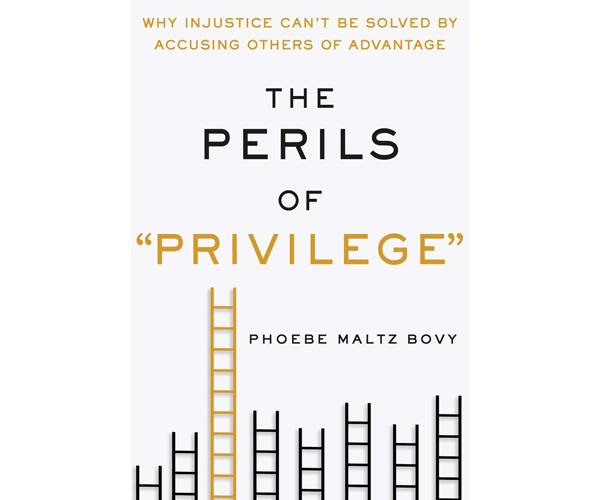Fixating on privilege hasn’t helped the fight against injustice, writes Phoebe Maltz Bovy, AB’05.
If you’ve spent any time on Twitter or in blog comments, you’ve likely witnessed—or participated in—one of the many skirmishes of the privilege wars. One stranger insists another cannot see a given issue clearly because they have been too fortunate.
Writer Phoebe Maltz Bovy, AB’05, began chronicling these online interactions on her blog What Would Phoebe Do? (an outgrowth of her Maroon column of the same name from nearly a decade ago). The new and highly charged way of debating issues related to class, gender, and race intrigued her—and troubled her too.
In The Perils of “Privilege”: Why Injustice Can’t Be Solved by Accusing Others of Advantage (St. Martin’s Press, 2017), Bovy explores the turbulent online conversation around the idea. Her comments below have been condensed and edited.
What are the pros and cons of what you call the “privilege framework”?
There are two big pros. One is people should understand system inequality and injustice are real. On average, a black person will have it harder than a white person in America. This should be better understood, not less understood.
Second, there is value in being able to vent about people being oblivious, separate from whether the oblivious party ever changes their ways.
One of the disadvantages, though, is that it changes conversations from ones about society and how society is structured to the ultimately trivial and distracting question of whether any individual truly “gets” their own personal place in every hierarchy. This can backfire, because it encourages a sort of defensiveness. Somebody can always say, “Maybe I’m privileged in this one way, but not in this other way.” Then you’re having a conversation about an individual’s privilege, rather than society.

Why the fixation on privilege?
This topic started to emerge around 2009. The recession got people thinking about class in a way that Americans hadn’t been so openly discussing before. The recession led the more class-privileged people in the country to be a bit ashamed and to try to hide it. This led also to a phenomenon of rich people trying to seem not rich, in a way that hadn’t been around so much before, at least in America.
The internet and social media play a big role. People are having political arguments with others whose identities they just don’t know. You have no sense of who somebody is, whether they’re a have or a have-not in any sort of general sense that would be obvious if you met them. Online, things are very confusing. There’s the new populism, especially the right-wing populism that started with Sarah Palin talking about who is and isn’t American.
There’s a conservative version of this conversation as well that involved telling white well-off liberals living in the so-called bubble to check their privilege.
In the book you focus on the phrase “your privilege is showing,” which you abbreviate “YPIS.” Why that phrase in particular?
What I found so fascinating about “your privilege is showing” as an expression is that it includes “your.” Those who defend the privilege callout will say people shouldn’t take it personally. It’s also the fact that it’s not a call to do anything. “Check your privilege” is at least saying “Don’t be obnoxious, don’t be rude.” Whoever you are in the world, that is going to be apparent. With YPIS, it seems like the advice is to pretend you’re not who you are. Which is the opposite of checking your privilege. It seems like it’s asking people to pretend they don’t have the advantages they do.
What’s a better way to talk about privilege?
What matters more than the words used is to step back and ask, “Are you talking about individuals, or are you talking about society?” Having conversations about where any individual stands on their own privilege is a dead end. You can focus on bigger changes, rather than on whether your friends are perfectly self-aware—getting people to do different things rather than getting them to understand themselves on some deeper level.
